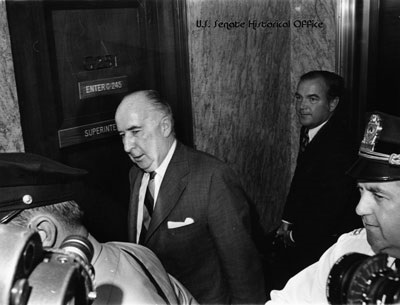What Can a Teacher Learn From a Criminal Lawyer?
Jamie Keddie, Spain
Imagine this: you are a prosecuting lawyer and you are questioning a powerful political figure – a man called John N. Mitchell. Mitchell was the United States Attorney General during the infamous Watergate scandal, and one of president Richard Nixon’s closest friends.

This picture was taken just before Mitchell testified to the Senate Watergate Committee in 1973. That's him on the left.
At this level of power, Mitchell had to be aware of the nefarious activities of the Republican Party in the early 70s. So, the question was: to what extent was he involved?
But now, under direct questioning on the stand, Mitchell denies everything. It’s incredible that such an influential individual should know nothing of the scandal, especially since those above, below and around him were so heavily involved. How could this possibly be the case?
Of course, it wasn’t the case. Everyone knew that Mitchell was lying through his teeth. So what can a prosecuting lawyer do when a defendant claims that butter wouldn’t melt in his mouth?
This is a question that lawyer Irving Younger used to ask. Irving was famous for his 10 Commandments of Cross Examination. And a few weeks ago, a talk that he gave in the late 70s went viral on YouTube.
www.youtube.com/watch?v=dBP2if0l-a8
Irving Younger said that he always dreamt of prosecuting John N. Mitchell in the Watergate hearings. And in the talk, he says that he would have carried out his cross examination with just one single question:
- Prosecutor: John N. Mitchell – can you confirm that you were born on September the 15th, 1913?
- John N. Mitchell: Yes, I can.
- Prosecutor: I have no further questions.
Eh?
What a wasted opportunity! Why would the prosecutor stop there? What does Mitchell’s date of birth have to do with anything? What could this line of questioning possibly achieve?
In order to understand this, it’s important to realize that the job of a trial lawyer is less about prosecuting or defending, and more about persuading a jury. If a trial lasts for days, jurors’ minds will inevitably move between various degrees of attention. In other words, while some jurors will be completely focused on the trial, others may be lost in their own thoughts. In this way, courtrooms can resemble classrooms. Similarly, when presented with so much information and so many arguments, different jurors will retain different details about the case. To any teacher who has used assessment, this may also sound familiar.
As all experienced teachers and trial lawyers know, communication is a messy business. But right now, after the shortest and seemingly most useless cross examination ever, there is something that you have successfully achieved: curiosity.
Irving Younger argues that if you want to get someone to remember something and put it to the front of their mind, the best way to do it is to create a prolonged period of unsatisfied curiosity. And the moment for trial lawyers to satisfy a jury’s curiosity is during the summation. Irving Younger’s fictitious summation would have gone something like this:
Ladies and gentlemen, members of the jury. You have sat patiently through hours of evidence. You have listened to us questioning John N. Mitchell – a man whose political influence can be surpassed only by the president himself. And yet, this is a man who claims to know absolutely nothing of the institutionalized corruption which took place all around him during his years in office.
Ladies and gentlemen, do you remember my cross examination? I asked John N. Mitchell to confirm that his date of birth is September the 15th, 1913. You do remember – excellent. Do you know why I stopped the questioning there? You don’t? Would you like me to explain? Well, OK – I will do that now.
Personally, I think that there is just one key fact that tells us everything we need to know about this man and his testimonial. And as a result of my question which, ladies and gentlemen, he answered under oath, we can now be 100% sure that …
John N. Mitchell was not born yesterday.
I rest my case.

Please check the Practical uses of Technology in the English Classroom course at Pilgrims website.
Please check the Methodology and Language for Secondary course at Pilgrims website.
Please check the Teaching Advanced Students course at Pilgrims website.
Please check the English Language course at Pilgrims website.


|